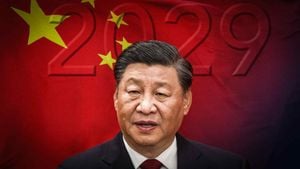Donald Trump has made headlines once again, hinting at the possibility of running for a third term as President of the United States during his recent speech at the Hyatt Regency Hotel in Washington, D.C. Hot off the heels of his decisive victory over California's Kamala Harris, Trump, who served as the 45th president from 2017 to 2021, told congressional Republicans, "I suspect I won’t be running again...Unless you say, ‘He’s so good, we have to figure it out.’" The remark, meant to be taken lightly, sent ripples through the political community, prompting laughter among his supporters.
This teasing comment isn't just frivolous banter; it plays on the deeply entrenched concerns about Trump's political ambitions and the constraints of the U.S. Constitution. With the ratification of the 22nd Amendment, presidents are limited to two terms. Yet, Trump's charisma and fervent supporter base have left some GOP members contemplating loopholes or the potential for him to find creative ways to extend his political reign.
Trump's return to the White House marks not only his second term, but also the first time since Grover Cleveland (the only president to serve two non-consecutive terms) for such a transition to occur again. The atmosphere surrounding his return contrasts sharply with the tumultuous departure four years prior, accentuated by tension with outgoing President Joe Biden. This meeting was far more cordial, showcasing not just political rivalry but the dynamics of leadership shifting back to Trump.
During this transitional period, Trump has emphasized unity among Republicans. During his recent address, he backed House Speaker Mike Johnson, urging the party to "unify" and identify key legislative achievements—they need to roll out his agenda swiftly. This time around, the obstacles appear to be more about extreme factions within the GOP rather than establishment figures like Mitch McConnell, who Trump previously wrestled against during his first term.
The challenge moving forward lies with the House Freedom Caucus, whose members have shown willingness to disrupt party cohesion. Trump seems determined to keep the peace, declaring to the congressional rebels, "Get it all done. Unify." Such statements have seemingly quelled pressure within the party to push for radical changes, at least momentarily.
Meanwhile, Trump's choice of his cabinet has stirred the pot. With appointments, including naming his previous campaign manager, Susie Wiles, as Chief of Staff, he’s positioned seasoned politicians to aid his political maneuvering. This appointment aligns with Wiles’ reputation as one of the most formidable conservative operatives—known as the “ice maiden.” Her tenure as campaign manager helped him regain prominence against the Democratic party's stronghold.
Trump also chose fellow billionaire Elon Musk to spearhead his newly created Department of Government Efficiency, amusingly named after the popular Doge meme. With Musk at the helm of cost-cutting, Trump aims to dismantle perceived bureaucratic inefficiencies and push through drastic reforms. Statements from Musk reveal his excitement, promising to send shockwaves through the government, indicative of the aggressive agenda Trump plans to pursue upon assuming office.
On the heels of these developments, legacy concerns surrounding Trump's potential to maneuver around the traditionally defined limitations of presidential terms loom large. While some Republican representatives have dismissed his jokes about running for another term as harmless banter, others are uneasy, worrying about the optics of simultaneously mockingly referring to the constitutional term limits.
"That was clearly a joke," asserted Representative Tim Burchett, trying to downplay the serious undertones surrounding Trump's remarks. He noted how quickly media narratives could shift to portray Trump's jokes as credible threats against constitutional integrity.
Nonetheless, Trump has had his fair share of quips about authority, joking previously about being dictator for just one day if he were to close the U.S-Mexico border. This blending of humor with implied authority often resonates well with his base but raises eyebrows among opponents who question the seriousness with which he takes democratic principles.
His supporters find excitement levels at their peak with Trump’s return—they want to witness the grand political showmanship of Trump's presidency. The media access for this second inauguration is tighter, with more secret service safeguards than during his first term, showcasing the heightened security concerns tied to his sensational return.
With the dust settling from the 2024 election and Trump's triumphant narrative building momentum, questions arise about how he will solidify his power and rally Republicans around his programs. The GOP's recent gain of House seats gives Trump leverage to push through initiatives, drawing on the party's solidarity united under his ambition and vision of America.
Observers now await to see whether Trump will push for legislative action with the same vigor as before. His administration's effectiveness hinges on how he reconciles differences within his party and manages external pressures. Will he move boldly to reshape American governance, or will his administration face obstacles similar to his first term, where Republican infighting stymied his agenda and fractured party loyalty?
Trump's presidency and its course provide ample discussions among political theorists and casual audiences alike. Was his initial term just the prelude to something larger? Can he run again, or will reality curtail his ambitions? For now, his supporters tap their feet, eager for the drama of Trump’s second act and the prospect of his potential legacy reshaping America's political narrative.



